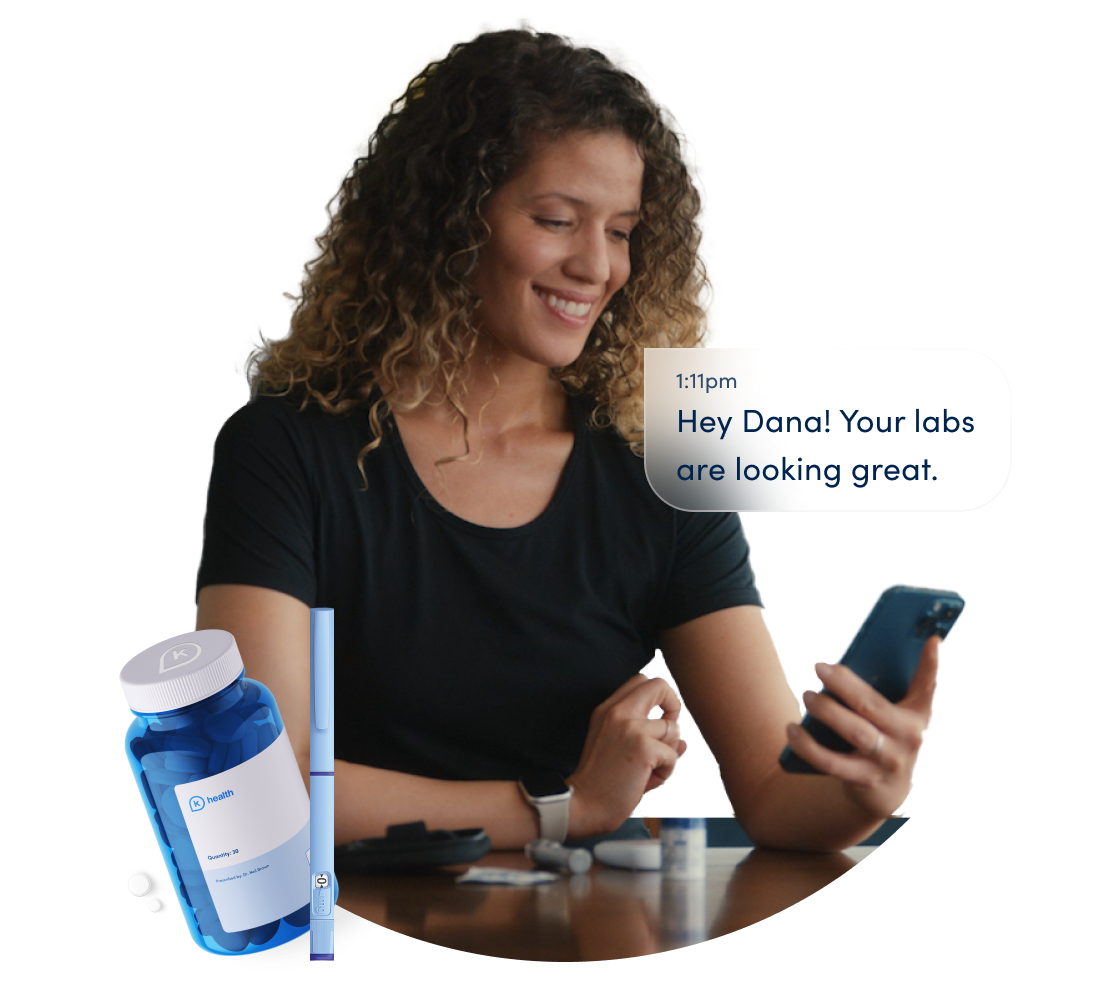People who have type 2 diabetes can control blood sugar levels in many ways. Dietary changes and exercise are essential, but some natural remedies may also lead to improvements. In this article, we’ll explore 9 possible natural remedies for blood glucose balance, effectiveness, and important warnings to understand.
Apple Cider Vinegar
A popular internet remedy for many things, apple cider vinegar (ACV) is often too good to be true. When it comes to blood glucose balance, though, there might be some potential. A review of studies looking at how ACV could impact various health factors found significant beneficial effects for fasting blood sugar levels.
By consuming ACV daily, fasting blood sugar levels decreased by an average of 7.97 mg/dL. While the specific way that ACV improves fasting glucose is not fully understood, it is thought to slow down the stomach’s emptying of contents, which increases how much glucose can be taken into cells and slows the liver from making more glucose. ACV can also improve insulin production.
The best improvements in blood sugar were found in studies that lasted longer than 8 weeks. The most dramatic impacts, like reducing fasting glucose by 16 mg/dL, were noted in people who had type 2 diabetes and had higher levels of fasting glucose. ACV will have to be consumed daily to get these potential benefits, although the study noted that consuming a lot was unnecessary. The midrange intake for the study was around 1 cup per day.
Talk to a doctor from home
Manage diabetes medications without leaving your house.
Fiber
Fiber supports better blood sugar balance because it slows down carbohydrate digestion. Because of this, blood sugar levels do not rise as sharply after meals.
There are two types of fiber. Soluble fiber has been shown to be essential for healthy blood sugar management. Insoluble fiber, the other type, has health benefits but does not as directly impact glucose levels.
Foods rich in soluble fiber include:
- Beans
- Brussels sprouts
- Sweet potatoes
- Avocado
- Broccoli
- Apples
- Pears
- Sunflower seeds
- Flaxseeds
- Oats
- Hazelnuts
The current recommended daily intake for fiber is:
- 21-25 grams for adults who were born female
- 30-38 grams for adults who were born male
Most people consume an average daily fiber intake of just 15 grams.
Magnesium
Magnesium is an essential mineral. It is found in many foods, but the average person still does not get enough in their daily diet. Magnesium supports more than 300 different enzymes and chemical reactions in the body.
Digestion, metabolism, and energy processes in the body rely on these reactions, so if your body is low in important nutrients that fuel the process, it may be harder for your body to function at its best.
Magnesium also supports healthy bones and muscles, immunity, blood pressure, and heart health. Research associates magnesium-rich diets with a reduced risk for diabetes. But low intakes of magnesium can lead to insulin resistance and blood sugar problems.
If you already eat many foods that are rich in magnesium, you do not need to take a dietary supplement. If your diet is low in magnesium, increase foods that contain it. Before you start taking a magnesium supplement, ask your healthcare provider if that’s the best choice for you.
Foods that are good sources of magnesium include:
- Pumpkin seeds
- Chia seeds
- Almonds
- Spinach
- Cashews
- Black beans
- Edamame
- Baked potatoes
- Brown rice
- Yogurt
- Oatmeal
- Kidney beans
- Bananas
- Avocado
Chromium
Chromium is a trace mineral, which means that it is only needed in small amounts. But if the body does not have enough, it can still cause a big impact. Chromium is necessary for healthy fat and carbohydrate digestion. It also supports normal insulin sensitivity in the body.
Some research on chromium shows an effect between chromium and insulin resistance, but not conclusively enough to recommend chromium supplements for managing blood sugar in diabetes. Most people probably get enough chromium in their diets unless they have extreme restrictions, food allergies, or other dietary challenges.
The recommended dietary allowance (RDA) of chromium is between 30-35 mcg for persons born male and between 20-25 mcg for persons born female. Dietary needs for chromium increase to 30 mcg in pregnancy and 45 mcg for people who are breastfeeding.
Chromium is found in many foods, but the actual levels can be different based on where the food was grown and agricultural processes since it enters food from soil and water sources as it is grown.
Foods that typically contain higher amounts of chromium include:
- Ham
- Brewer’s yeast
- Beef
- Lettuce
- Turkey
- Apple
- Green beans
- Chicken
- Peas
- Carrots
- Eggs
If you do not eat many foods that contain chromium, ask your medical provider if a chromium supplement is right for you. Most people do not need one, and studies on chromium supplements have shown mixed results.
Aloe Vera
While people think of aloe vera as a sunburn remedy, the juice and gel from the plant can also support how the body uses and stores glucose.
Research shows that it is especially effective in people whose fasting glucose levels are significantly elevated and may help decrease fasting blood sugar by as much as 46 mg/dL and hemoglobin A1C by just over 1%. However, larger studies are needed to ensure that these results can be repeated.
Consuming large amounts of aloe vera juice can lead to gastrointestinal upset, so if you plan to include it in your daily diet, use it in moderation.
Cinnamon
Cinnamon is a popular spice for many reasons, and it also comes with health benefits. It can support people who have type 2 diabetes in a few ways. Cinnamon can be used to flavor dishes and even coffee, reducing the need for added sugars.
But it may also be supportive for improving fasting blood sugar levels as part of other diabetes treatments. Other research has found possible benefits for insulin resistance, although the type of cinnamon, frequency of consumption, and other lifestyle factors can all influence how well cinnamon works.
Cinnamon won’t replace the need to address type 2 diabetes with other treatment methods but may be effective at improving overall responses. Ceylon cinnamon is less commonly found than cassia cinnamon, but seems to have more potential for benefits. Most research on cinnamon contains limitations that make it challenging for healthcare providers to determine a specific intake that could lead to benefits.
Talk to a doctor from home
Manage diabetes medications without leaving your house.
Fenugreek
Fenugreek is a seed that is used in several types of dietary supplements. It is fiber-rich and is thought to have properties that help to slow down how quickly the body breaks down sugar. It is used medicinally in other countries to treat patients who have type 2 diabetes. Small studies have also shown benefits for glucose and insulin improvements.
No substantial studies or large randomized clinical trials have been done to determine if fenugreek supplements, and what dosage, could support glucose management. If you are interested in considering a fenugreek supplement, speak with a healthcare provider about the potential benefits.
Ginseng
There are several varieties of ginseng. Research on Panax ginseng, also known as American ginseng, shows some potential benefits for improving fasting glucose and blood sugar control by supporting improved insulin responses in people with type 2 diabetes. However, the study shows no effects for prediabetes or people with typical glucose responses.
Before starting a ginseng supplement, check with a healthcare provider. Dietary supplements are not regulated by the U.S. Food and Drug Administration (FDA) for effectiveness. Brands can contain different reported dosages or other contaminants.
Ask your pharmacist or medical provider for trusted brand recommendations or consult other evidence-based resources, like ConsumerLab, which independently tests supplement products and reports on improperly labeled dosages, contaminants, and other concerns.
Probiotics
Probiotics are the good bacteria that populate the gut. They can have many benefits, including supporting healthy blood sugar responses. Research shows that blood sugar levels tend to be better in people who have more diversified guts.
This can happen from eating a wide variety of foods containing probiotics and taking probiotic supplements containing multiple species of bacteria.
You do not necessarily need a probiotic supplement unless you are unable to eat foods that contain probiotics, such as:
- Yogurt
- Kefir
- Kimchi
- Sauerkraut
- Tempeh
- Miso
Are Natural Remedies Effective for Diabetes?
There are many natural remedies reported to support diabetes. Many of them are not backed by evidence from the types of large clinical trials that medical providers use to make decisions about what is safe and effective for their patients.
Safety and Warnings
Your healthcare provider knows your history, as well as the other medications that you take, so any natural remedies that you are interested in should be discussed with them. Even natural remedies can interact with drugs, other supplements, and health conditions. Just because something contains the word natural does not mean it is effective or safe.
How to Manage Diabetes Online
Did you know you can have a primary care doctor online?
Check your symptoms, explore conditions and treatments, and if needed, text with a healthcare provider in minutes through K Health. K Health’s AI-powered app is based on 20 years of clinical data.
Frequently Asked Questions
K Health has strict sourcing guidelines and relies on peer-reviewed studies, academic research institutions, and medical associations. We avoid using tertiary references.
-
The effect of apple cider vinegar on lipid profiles and glycemic parameters: a systematic review and meta-analysis of randomized clinical trials. (2021).
https://www.ncbi.nlm.nih.gov/pmc/articles/PMC8243436/ -
Glycemic Index (GI) or Glycemic Load (GL) and Dietary Interventions for Optimizing Postprandial Hyperglycemia in Patients with T2 Diabetes: A Review. (2020).
https://www.ncbi.nlm.nih.gov/pmc/articles/PMC7352659/ -
High fiber diet. (2022).
https://www.ncbi.nlm.nih.gov/books/NBK559033/ -
Magnesium. (2022).
https://ods.od.nih.gov/factsheets/Magnesium-HealthProfessional/ -
Effects of Chromium Picolinate Supplementation on Cardiometabolic Biomarkers in Patients with Type 2 Diabetes Mellitus: a Randomized Clinical Trial. (2020).
https://www.ncbi.nlm.nih.gov/pmc/articles/PMC7192664/ -
Chromium. (2022).
https://ods.od.nih.gov/factsheets/Chromium-HealthProfessional/ -
Effect of Probiotics on Glucose and Lipid Metabolism in Type 2 Diabetes Mellitus: A Meta-Analysis of 12 Randomized Controlled Trials. (2017).
https://pubmed.ncbi.nlm.nih.gov/28638006/ -
Impact of Gut Microbiota on Host Glycemic Control. (2019).
https://www.ncbi.nlm.nih.gov/pmc/articles/PMC6363653/ -
Effects of probiotics supplement in patients with type 2 diabetes mellitus: A meta-analysis of randomized trials. (2017).
https://pubmed.ncbi.nlm.nih.gov/28237613/ -
Cinnamon: Potential Role in the Prevention of Insulin Resistance, Metabolic Syndrome, and Type 2 Diabetes. (2010).
https://www.ncbi.nlm.nih.gov/pmc/articles/PMC2901047/ -
Efficacy and safety of cinnamon in type 2 diabetes mellitus and pre-diabetes patients: A meta-analysis and meta-regression. (2019).
https://pubmed.ncbi.nlm.nih.gov/31425768/ -
Cinnamon Use in Type 2 Diabetes: An Updated Systematic Review and Meta-Analysis. (2013).
https://www.ncbi.nlm.nih.gov/pmc/articles/PMC3767714/ -
An ethnobotanical survey of medicinal plants used for diabetes treatment in Rabat, Morocco. (2019).
https://www.ncbi.nlm.nih.gov/pmc/articles/PMC6441794/ -
Role of Fenugreek in the prevention of type 2 diabetes mellitus in prediabetes. (2015).
https://www.ncbi.nlm.nih.gov/pmc/articles/PMC4591578/ -
Review of Ginseng Anti-Diabetic Studies. (2019).
https://www.ncbi.nlm.nih.gov/pmc/articles/PMC6943541/ -
Reduction of Fasting Blood Glucose and Hemoglobin A1c Using Oral Aloe Vera: A Meta-Analysis. (2016).
https://www.liebertpub.com/doi/abs/10.1089/acm.2015.0122?journalCode=acm

 Medically reviewed
Medically reviewed
